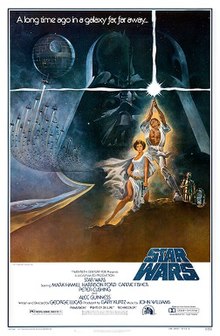
Back Star Wars Episode IV: A New Hope Afrikaans Star Wars Episode IV: A New Hope AN حرب النجوم (فيلم) Arabic حرب النجوم ARZ Star Wars: Episode IV - A New Hope AST Ulduz müharibələri (film) Azerbaijani اولدوز ساواشلاری: بؤلوم ۴-جو - یئنی بیر اومود AZB Зорныя войны. Эпізод IV: Новая надзея Byelorussian Зорныя войны. Эпізод IV: Новая надзея BE-X-OLD Междузвездни войни: Епизод IV – Нова надежда Bulgarian
| Star Wars | |
|---|---|
 Theatrical release poster by Tom Jung | |
| Directed by | George Lucas |
| Written by | George Lucas |
| Produced by | Gary Kurtz |
| Starring | |
| Cinematography | Gilbert Taylor |
| Edited by | |
| Music by | John Williams |
Production company | |
| Distributed by | Twentieth Century-Fox |
Release date |
|
Running time | 121 minutes[1] |
| Country | United States[2] |
| Language | English |
| Budget | $11 million[3][4] |
| Box office | $775.4 million[3] |
Star Wars (later retitled Star Wars: Episode IV – A New Hope) is a 1977 American epic space opera film written and directed by George Lucas, produced by Lucasfilm and distributed by Twentieth Century-Fox. It is the first film released in the Star Wars film series and the fourth chronological chapter of the "Skywalker Saga". Set "a long time ago" in a fictional galaxy ruled by the tyrannical Galactic Empire, the story follows a group of freedom fighters known as the Rebel Alliance, who aim to destroy the Empire's newest weapon, the Death Star. When the Rebel leader Princess Leia is captured by the Empire, Luke Skywalker acquires stolen architectural plans of the Death Star and sets out to rescue her while learning the ways of a metaphysical power known as "the Force" from the Jedi Master Obi-Wan Kenobi. The cast includes Mark Hamill, Harrison Ford, Carrie Fisher, Peter Cushing, Alec Guinness, Anthony Daniels, Kenny Baker, Peter Mayhew, David Prowse, and James Earl Jones.
Lucas had the idea for a science fiction film in the vein of Flash Gordon around the time he completed his first film, THX 1138 (1971), and he began working on a treatment after the release of American Graffiti (1973). After numerous rewrites, filming took place throughout 1975 and 1976 in locations including Tunisia and Elstree Studios in Hertfordshire, England. Lucas formed the visual effects company Industrial Light & Magic to help create the film's visual effects. Star Wars suffered production difficulties: the cast and crew believed the film would be a failure, and it went $3 million over budget due to delays.
Few were confident in the film's box office prospects. It was released in a small number of theaters in the United States on May 25, 1977, and quickly became a surprise blockbuster hit, leading to it being expanded to a much wider release. Star Wars opened to positive reviews, with praise for its special effects. It grossed $410 million worldwide during its initial run, surpassing Jaws (1975) to become the highest-grossing film until the release of E.T. the Extra-Terrestrial (1982); subsequent releases have brought its total gross to $775 million. When adjusted for inflation, Star Wars is the second-highest-grossing film in North America (behind Gone with the Wind) and the fourth-highest-grossing film of all time. It received Academy Awards, BAFTA Awards, and Saturn Awards, among others. The film has been reissued many times with Lucas's support—most significantly the 20th-anniversary theatrical "Special Edition"—and the reissues have contained many changes, including new scenes, visual effects, and dialogue.
Often regarded as one of the greatest and most influential films ever made, Star Wars quickly became a worldwide pop culture phenomenon, launching an industry of tie-in products, including novels, comics, video games, amusement park attractions and merchandise such as toys, games, and clothing. It became one of the first 25 films selected by the United States Library of Congress for preservation in the National Film Registry in 1989, and its soundtrack was added to the U.S. National Recording Registry in 2004. The Empire Strikes Back (1980) and Return of the Jedi (1983) followed Star Wars, rounding out the original Star Wars trilogy. A prequel trilogy and a sequel trilogy have since been released, in addition to two standalone films and various television series.
- ^ "Star Wars". British Board of Film Classification. Archived from the original on January 27, 2016. Retrieved May 25, 2013.
- ^ "Star Wars (1977)". British Film Institute. Archived from the original on July 9, 2017.
- ^ a b Cite error: The named reference
BOMwas invoked but never defined (see the help page). - ^ Lamar, Cyriaque (January 13, 2012). "Behold, the 1977 budget breakdown for Star Wars". io9. Archived from the original on March 6, 2016. Retrieved March 3, 2016.